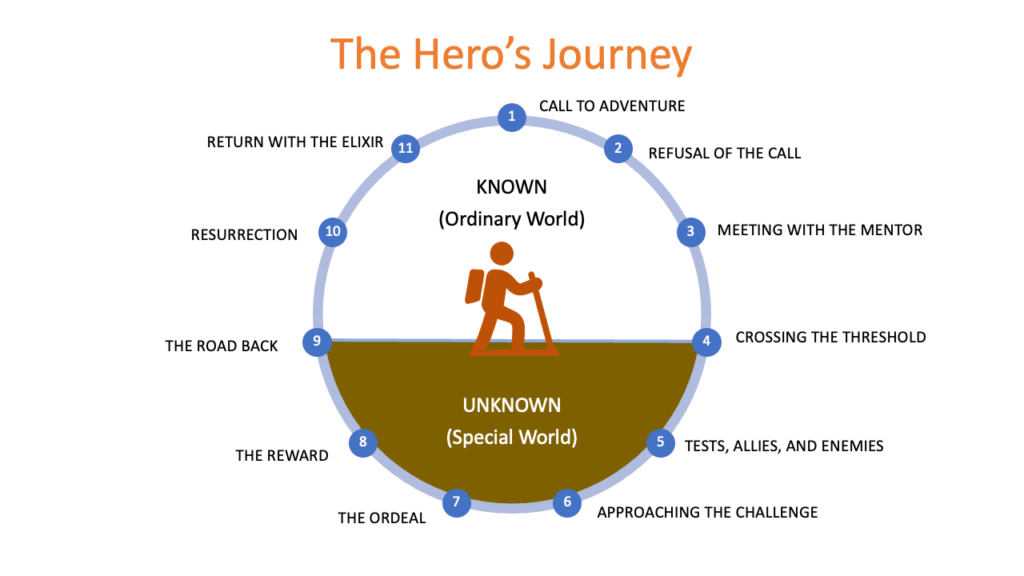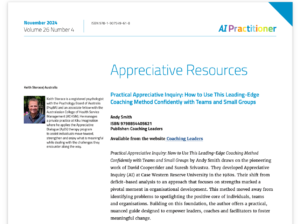The Hero’s Journey and How It Applies to Personal Development and Coaching

[ad_1]

In his book The Hero With A Thousand Faces, Joseph Campbell proposes that the hero myths of pretty much all the world’s cultures follow a similar structure, that he called the ‘monomyth’ or the ‘Hero’s Journey’.
The hero is typically someone who goes out into the unknown and achieves great things for their tribe, their nation, or humanity as a whole. According to Campbell, the Hero’s Journey can be found not just in myths, but in stories, movies, initiation into spiritual mysteries or esoteric knowledge, and psychological development.
The book describes 17 stages of the journey. The description here mostly follows the simplified 12-stage structure set out by Hollywood screenwriter Christopher Vogler in The Writer’s Journey: Mythic Structure for Writers and summarised in the internet archive here: coachingleaders.co.uk/hj
The adventure starts in the mundane, ordinary world, where the hero may be bored, stressed, or dissatisfied.
Stages of the Journey
- The Call to Adventure: this can be a literal invitation from another person to go on an adventure, or changes in the hero’s circumstances that force a change.
- Refusal of the Call: the hero tries to resist the call, through fear of the unknown or reluctance to give up the comfortable life they are familiar with.
- Meeting with the Mentor: the hero encounters an experienced navigator of the wider world, and/or a magical being, who gives advice, gifts, or training as preparation for the journey.
- Crossing the Threshold: the hero passes out of their old life and into the unknown, where all seems unfamiliar and different rules apply.
- Tests, Allies, and Enemies: the hero has to pass through trials and challenges, with the help of allies and often under threat from enemies, whether new or old.
- Approaching the Challenge: the hero, alone or with allies, prepares for their greatest challenge in this unfamiliar world.
- The Ordeal: the hero confronts their greatest fear – often, there is a literal or metaphorical death and rebirth.
- The Reward: the hero gains a magical object, knowledge, or life-changing insight.
- The Road Back: the hero passes back into the ordinary world with the Reward, perhaps having to overcome further obstacles or escape from pursuit.
- Resurrection: on the threshold of home, the hero faces one last challenge or test. This can be another literal or metaphorical death and rebirth.
- Return With the Elixir: the ‘Elixir’ is the treasure, reward, or just acquired wisdom that the hero has brought back from the special world, often used to benefit community. This may look like going back to the old life, but everything is different as the hero experiences life at a different level. The hero should make sure that they do learn the lessons from their journey; Vogler points out that many comedies end with the foolish protagonist learning nothing from experience, and about to make the same mistakes as before.
Vogler’s article gives examples of the Hero’s Journey structure from classic movies like The Wizard of Oz, Star Wars, E.T., and Casablanca. Elements are also very apparent in The Matrix, The Lord of the Rings (book and movies), and Bill & Ted’s Excellent Adventure.
Questions to Consider for Each Stage
- What is, or was, your Call to Adventure?
- If you Refused the Call, what motivated that, and how strong was that motivation? If you answered the Call, how did you overcome the Refusal?
- Who are your Mentors or ‘magical helpers’?
- What is or was your Threshold? How did you decide to cross it – or are you still deciding?
- What Tests or challenges have you overcome? Who are your Allies?
- How are you preparing, or did you prepare, to face your Challenge?
- What is your greatest challenge? How did you, or how will you, overcome it?
- What is the Reward that you seek? Consider the Rewards you have already gained.
- How will you bring the Reward back into the ‘ordinary world’ with you?
- What further challenges will your integration into the ‘ordinary world’ bring, and how will you deal with them?
- What benefits will your Reward bring in the future – to you, to your work, to the people closest to you, and to your community as a whole?
And finally, switching the viewpoint to outside of your own journey: you’re probably a character in someone else’s journey too. So, to whom are you a:
- Mentor
- ‘Magical Helper’
- Guardian of the Threshold
- Ally
- or even Enemy?
What have you learned from considering yourself in these other roles?
If you need a Mentor, or even a ‘Magical Helper’, in the area of Appreciative Inquiry, maybe that could be me. At the very least, there is plenty of treasure waiting for you on this site in the form of resources and tips about Appreciative Inquiry, emotional intelligence, coaching, and leadership. Why not explore the site a bit more and see what Rewards you can bring back?
[ad_2]




